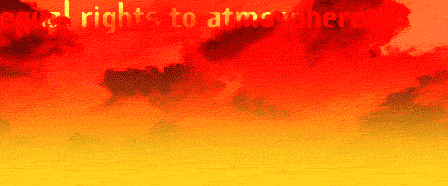|
 |
|
November 7th, 2001
First casualty
Rising sea levels force Tuvaluans to find new homes
Tuvalu, a tiny South Pacific nation of about 10,000 people whose existence is
threatened by rising sea levels, has entered into a unique agreement with New Zealand.
Under the agreement, New Zealand will accept an annual quota of 'climate refugees' from
Tuvalu. These citizens are being forced to leave as sea-water is inundating their homes.
The exodus of people from Tuvalu is expected to start in 2002 and the two countries expect
it to continue for the next 3-4 decades.
Australia, on the other hand, turned down a similar request by Tuvalu. "While New
Zealand responded positively in the true Pacific way of helping one's neighbours,
Australia on the other hand has slammed the door in our face. Its justification is to
compare Tuvaluans with the asylum seekers trying to enter Australia illegally," Paani
Laupepa told BBC News Online, assistant secretary, Ministry of Natural Resources, Energy
and Environment, Tuvalu.
Climate change has already become a reality for Tuvaluans. A group of nine islands with a
total land area of 26 square kilometres, Tuvalu is expected to be the first to be erased
from the surface of the Earth due to rising tides. "Perhaps the most pronounced
effect of climate change that we are actually seeing is the flooding of low-lying areas. A
couple of decades ago the flooding was not so bad as last year's," Laupepa said. In
addition to coastal erosion and droughts, the last decade saw an unusually high number of
tropical cyclones. Food produce is also getting affected due to salt-water intrusion. No
point on any island is higher than 4.5 metres and all fresh water is collected from
rainfall.
Rising sea level is one of the disastrous consequences of global warming which causes
thermal expansion of sea and melting of polar ice. Rising concentrations of heat trapping
gases like carbon dioxide in the atmosphere are considered responsible for global warming.
Industrialised nations, which are the main emitters of these gases, are bound by the 1997
Kyoto Protocol to limit emissions of such gases to a certain percentage. However, hardly
any country is on track to meet its commitments under the protocol. The US, which is the
biggest emitter of greenhouse gases, has in fact refused to ratify the protocol. Laupepa
feels that by doing so the US has effectively denied future generations of Tuvaluans their
fundamental freedom to live where their ancestors have lived for thousands of years.
return to the index |
|


